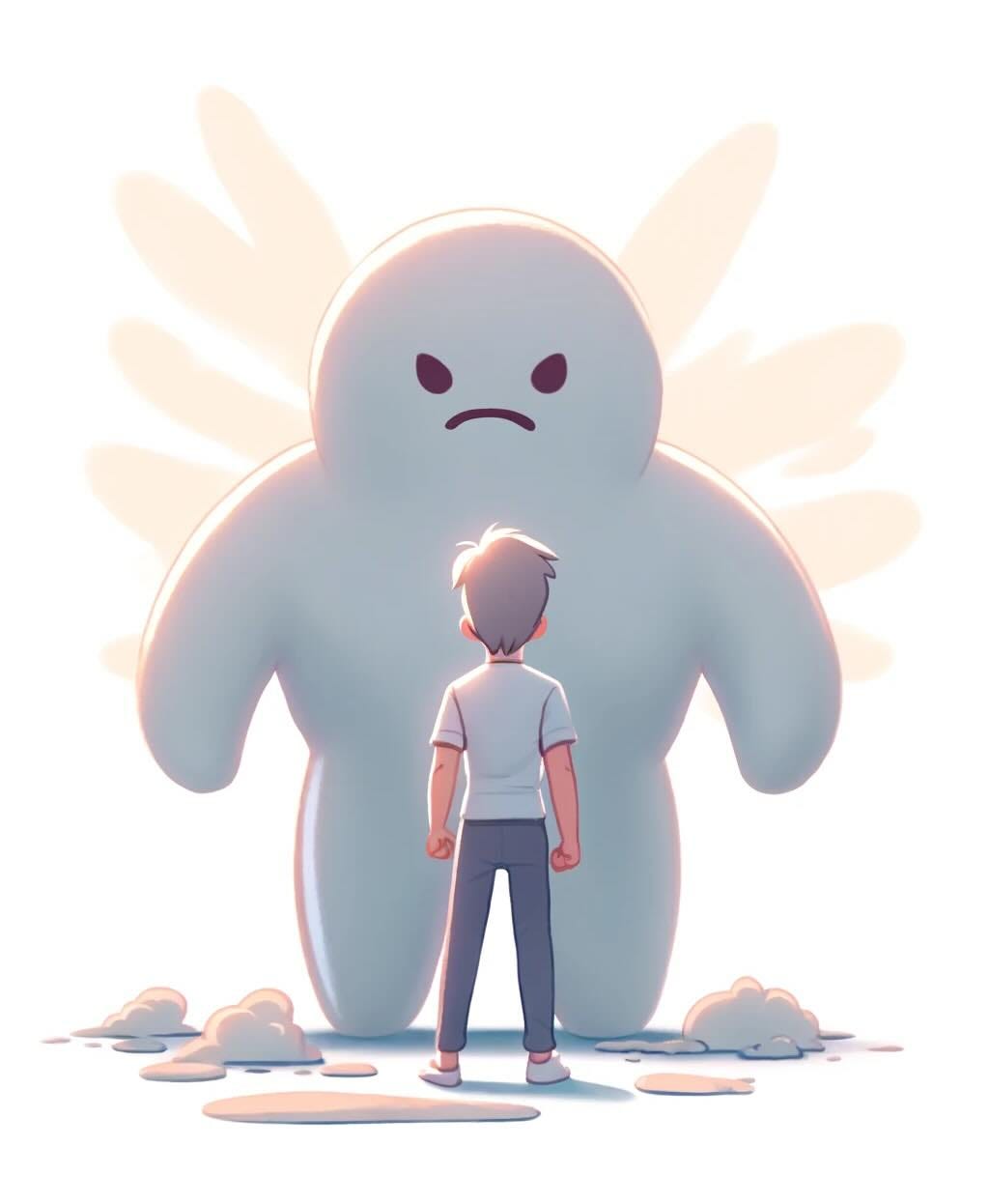Losing Weight Will Not Cure Your Eating Disorder
Let me explain why weight loss does not cure eating disorders, as an eating disorder therapist
In our culture, struggles with body image are nearly universal, creating a complex spectrum that ranges from poor body image to diagnosed eating disorders. At one extreme lies a distorted view of one's body, often intertwined with deep psychological issues beyond mere dissatisfaction with weight. Poor body image is only part of what constitutes an eating disorder. Someone who has an eating disorder lies at the extreme end of the spectrum, while someone with poor body image who wants to lose weight may not necessarily be there. Thus, it is crucial to differentiate between general body dissatisfaction and an eating disorder. Eating disorders are not merely conditions related to dietary habits or weight; they are mental illnesses. Such illnesses cannot be cured by making changes to the way you look.
While some argue that weight loss can improve self-esteem and mitigate some symptoms of eating disorders, this flawed belief not only reduces eating disorders to a mere issue of weight, but also overlooks the psychological complexities that characterise eating disorders, which may or may not manifest through physical weight changes.
The Role of the Inner Critic
Having an eating disorder convinces you that losing weight will be the magical solution to all problems. The little voice inside your head – your Inner Critic, the voice that criticizes and judges everything you do – tells you that you will finally stop hating yourself if you are thin enough. It argues that if you lose the weight, you will finally be able to do all the things you want to do and be the person you want to be. That you will not be binging anymore if you drop those couple of pounds. It reassures you that you will finally be happy, only if you look a certain way. This is why many people with an eating disorder believe that losing weight will cure them: they believe that being in a smaller body will take that voice away.
Why Losing Weight Is Not the Solution
One might agree and ask “If the Inner Critic is criticizing us for being in a big body and we make sure to be in a smaller body, wouldn’t we take a step towards curing the eating disorder if we encourage weight loss, as it is a part of it?”.

If you change according to the Inner Critic, the message you are signalling to yourself is that “The bully is right. There is something inherently wrong with you. To eliminate the wrongness, you need to change the way you look”. Your Inner Critic is a bully and would you change who you are based on what a bully says? Better question is, would you tell a child to change who they are, the way they look because they are getting bullied? No. Challenge the Inner Critic as you would a bully: with firmness and compassion towards yourself. Practice self-compassion exercises to actively dispute the harsh internal dialogue and soothe your Inner Child.
Something I hear quite often is when someone at a higher weight loses all the weight they want to lose, they still see themselves as having the body they had before. As if they have a filter over their eyes, influencing the way they perceive themselves. This shows that weight doesn’t equate to body image, but there is another component: subjective perception and feelings.
What influences our feelings and subjective perception?
Maladaptive schemas – limiting self-beliefs.
Understanding Maladaptive Schemas
Individuals who struggle with eating disorders are extremely unhappy with their body, but the truth is, they are unhappy with themselves. This extreme unhappiness is a reflection of the negative beliefs they hold about themselves – the maladaptive schemas. The schemas act as a filter in their eyes and their body is seen as a source of their wrongness and/or the unpleasant emotions evoked by unmet needs (this is can be acceptance, boundaries, sense of identity and many other things). So develops the idea that if they can change their body, they can correct this “wrongness”, meet their emotional needs and never feel the pain of the unmet needs. Fixating on a number on the scale is a way of coping with schemas and uncomfortable feelings brought on by schemas. Losing weight becomes an attempt at solving the “problem”, at correcting the “wrongness”. This weight loss wish comes from a place of hatred. You feel like you HAVE to lose the weight, that you can only feel good and be loved if you are in a smaller body.
If you want to read more about schemas and modes, in the context of eating disorders, see my blog post:
As Albert Einstein famously said “We cannot solve our problems with the same thinking we used when we created them”. Even if you were to subjugate to your Inner Critic and try to improve your body image by losing weight, it is still not enough to make your Inner Critic go away. We cannot solve the problem created by the Inner Critic by following the logic of the Inner Critic.
Pathways to Recovery
Inner Critic is the enforcer of maladaptive schemas. Your negative self-beliefs originated from long before you were in your current body. The problem may look like it is your weight but the truth is, losing weight is just a temporary solution to a bigger struggle here: the maladaptive schemas you have about yourself due to unmet emotional needs. These didn’t start with your current body, why would they be “cured” by changing your body?
Combat schemas and schema-driven behaviours by:
Recognizing weight fixation as a coping mechanism, not a solution.
Learning about your emotional needs and how they can be met.
Focusing on emotional healing rather than the scale.
Seeking therapy and support groups to address underlying issues.
I hear you saying “But Zeynep… I have an eating disorder and I’m unhappy with my body. I want to lose weight. What do I do then? Should I give up weight loss forever?”
You might want to lose weight, eat healthier and/or workout regularly to look a certain way. This is a personal choice. It might or it might not improve your body image. I don’t believe that wanting to lose weight is necessarily a bad thing… if it comes from a place of compassion and care for yourself. And you decide for yourself what the source of this wish is once you feel like your Healthy & Wise Self is stronger.
When clients come to me saying they want to lose weight while recovering, I tell them to park the goal of weight loss until after they have recovered from their eating disorder. It is probably hard to know right now whether it comes from a place of compassion and love or hatred. After working on the mental illness, with the help of the skills you will learn in therapy, you can decide for yourself if you want to lose weight or not. But right now, your eating disorder is making the decision for you. It’s time to gain the steering wheel back. This is your body, your life. Don’t let it be dominated by your eating disorder.
Compassion Over Self-Criticism
When you are no longer dominated by your eating disorder, if you are still unhappy with the way you look, you are more likely to make small changes rather than drastic ones, and take your time instead of rushing into it. When the maladaptive schemas are not as prominent, it will be easier to see your body as your friend and not your enemy, which may result in wanting your body to remain the same or wanting to change it with a more compassionate approach. As someone who has healthier, positive schemas, if you decide to lose weight, you will approach the situation with more love and compassion. You will try to find ways to work on it without punishing or restricting. You will think to yourself “How can I improve my life quality? What can I add to my life rather than subtract to feel better?”, not “What should I give up on?” or “How do I do this fast?”.
Are you ready to change how you see yourself and your body?
🌱I give online and in-person (Leiden, the Netherlands) therapy and counselling sessions for eating disorders, body image struggles and more. Send me a message via realisticbodytherapist.com
🌱Explore further resources on my blog.
Remember, the journey to recovery starts with understanding and compassion, not just for your body but for your entire self.






